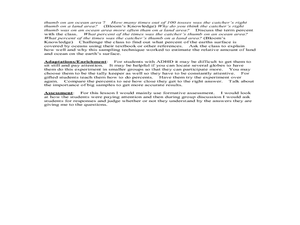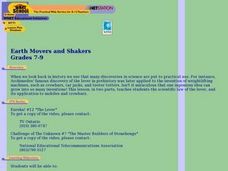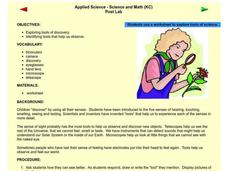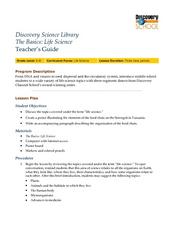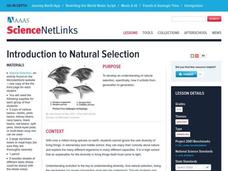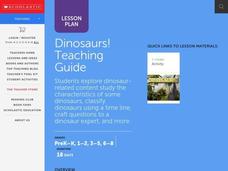American Chemical Society
The Discovery of Fullerenes
Carbon is the most common element on earth, so the innovative discovery of a new type of carbon molecule won the 1996 Nobel Prize. In the ready-to-go lesson, scholars learn about C60 and how it has opened up the entire area of...
Curated OER
Prehistoric Discoveries
Students agree or disagree with several statements about ancient animals, then read a news article about recent prehistoric discoveries. In this earth science and current events lesson, the teacher introduces the article with a...
Curated OER
What Part of the Earth's Surface is Covered by Oceans?
Third graders investigate oceans. In this Earth science lesson, 3rd graders predict how much of the Earth's surface is covered by oceans. Students determine if their predictions are accurate by throwing a globe to each other and then...
Virginia Department of Education
Mineral Identification
What's the difference between a rock and a mineral? And what properties are used to identify minerals? The first installment of a five-part series on earth materials and processes prompts young scientists to identify a set of...
Curated OER
Earth Movers and Shakers
Students explore how the centuries-old invention of the lever led to today's applications in mobiles and crowbars. They watch a video on the lever, then utilize worksheets imbedded in this plan to guide their experiments.
Curated OER
Earth's Energy Cycle: Albedo
Students complete all of the steps in the scientific inquiry process to study Earth's energy cycle; most specifically temperature and the effects of albedo (energy reflected back from Earth's surface) on temperature.
Curated OER
Voyage of Discovery
Students develop a sense of the scale of our solar system by creating a one to ten billion scale model. They calculate the relative sizes and distances for the planets and asteroid belt using a guiding worksheet. To create the model they...
Curated OER
Your Expedition of Discovery
Students study GPS and see how it is used to determine points on the Earths surface. In this expedition lesson plan students use GPS to find given coordinates.
NASA
The Discovery of Jupiter Radio Waves
Lead your class on a journey to the planet Jupiter and provide them with fun facts in the process. Learners explore radio waves emitted by Jupiter to further understand how this data helps our daily lives. They conclude by discussing...
NOAA
To Explore Strange New Worlds
It's time to boldly go where your class has not gone before! The introductory lesson in a five-part series takes young oceanographers aboard the NOAA Ship Okeanos to begin a study of ocean exploration. The lesson includes a comparison of...
Curated OER
The Basics: Earth Science
Middle schoolers define terms and watch a segment from a film. In this scientific theory lesson students work in small groups and draft a theory that was discussed in the program.
Curated OER
Scientists Discover Giant Frog Fossil
Students examine a world map and read a news article about the discovery of a giant frog fossil. In this earth science and current event lesson plan, the teacher introduces an article with a discussion about continental drift and a...
Curated OER
Rock Discovery
Fourth graders identify rocks in this discovery lesson by examining rock characteristics and processes. They identify basic properties of minerals and rocks. They revise their theories of the natural world, once they see and learn new...
Curated OER
Discovery Science Library: The Basics Physical Science
Young scholars examine friction and gravity. affect four sports. In this scientific discovery lesson, students examine how friction and gravity affect sports. They discuss, write, and illustrate the effect of different forces on various...
Curated OER
Student Guide: Evolution Videodisk from Videodiscovery
Students use this worksheet with the videodisk from Video discovery titled Evolution: Inquiries into Biology and Earth Science.Written because there is no computerized control program available, it is to be used with a standard videodisk...
NOAA
Journey to the Unknown
What's it like to be a deep-sea explorer? Tap into the imaginations of your fifth and sixth graders with a vivid activity, the second part of a six-part adventure. Learners close their eyes and submerge themselves in an expedition aboard...
Curated OER
Life on the Moon
Students study the physical properties of the Moon. In this life on the moon lesson students describe the ways life on the Moon would be different than on Earth.
Curated OER
Soil Layers
Ninth graders identify the different layers of soil. In this earth science lesson, 9th graders explain how limestone layers are formed. They identify the different parts of the coral colony.
Curated OER
Applied Science - Science and Math Post-Lab
Students use scientific tools. In this Applied Science lesson, students investigate the use of scientific tools to enhance observation and discovery. Students indicate how each tool assists scientific work.
Curated OER
The Basics:Life Science
Students explore concepts in life science using segments drawn from Discovery Channel. In this life science lesson, students participate in discussions about the food chain. Students create a poster to illustrate a predator and prey...
Curated OER
Introduction to Natural Selection
Students develop an understanding of natural selection, specifically, how it unfolds from generation to generation. They work in small groups to perform an experiment using beans. They use a worksheet imbedded in this plan to guide their...
Curated OER
The Global Precipitation Measurement Mission (GPM) Lesson
Introduce your class to one of the ways that technology is benefiting humanity. The Global Precipitation Measurement Mission involves the data collected by nine satellites from different countries with a united focus on studying world...
Curated OER
Earth's Age: The Dating Game
Young scholars conduct a simulation to determine radioactive decay and half-life. Using pennies, dice or sugar cubes as isotopes placed in shoe boxes simulating rocks, they hold five trials representing 1000 years each to find the...
Curated OER
Dinosaurs
Students will develop goals for inquiry. They will also improve content area reading and research skills. The context of studying dinosaurs will help learners to distinguish from organisms that live presently and those from the past...




